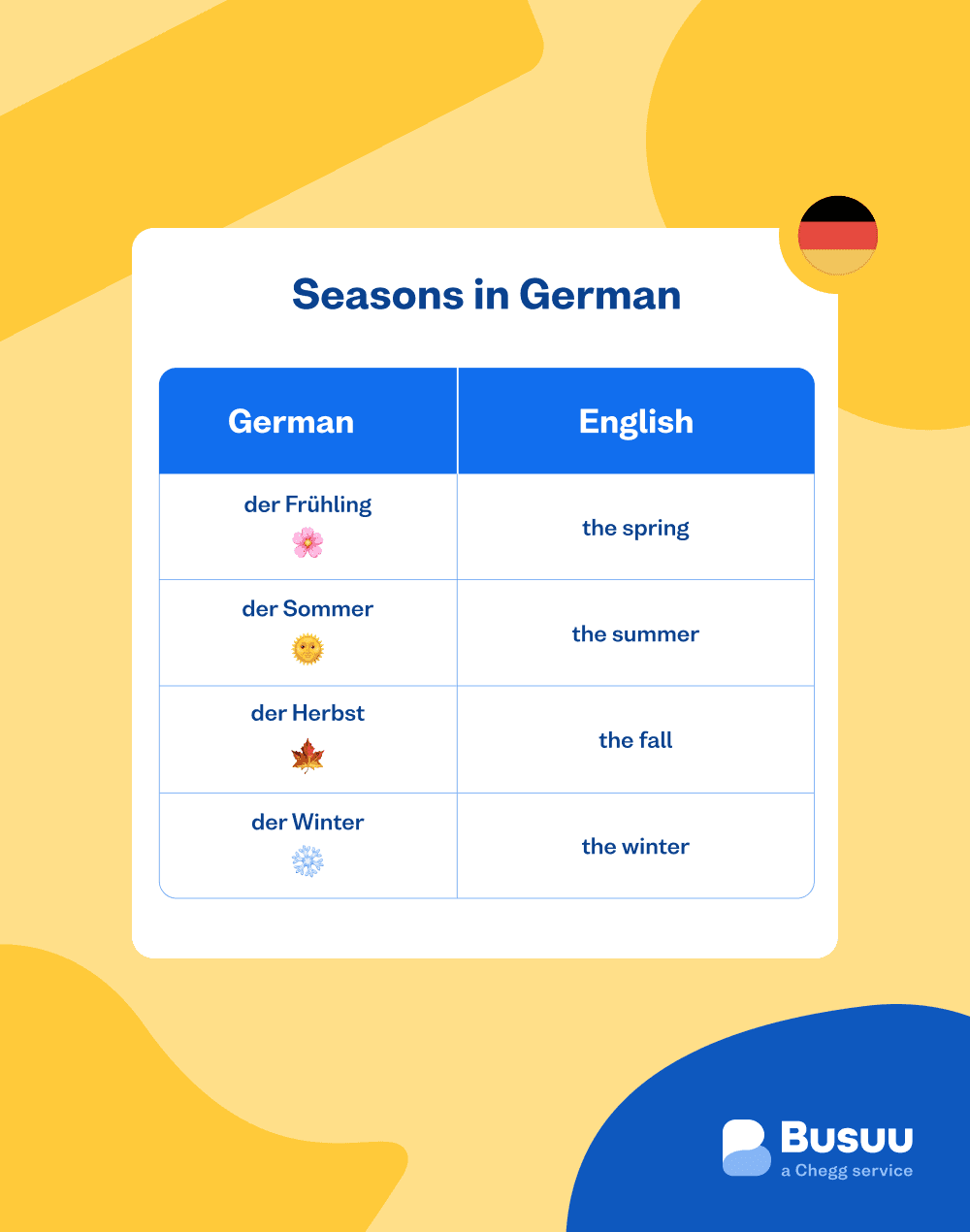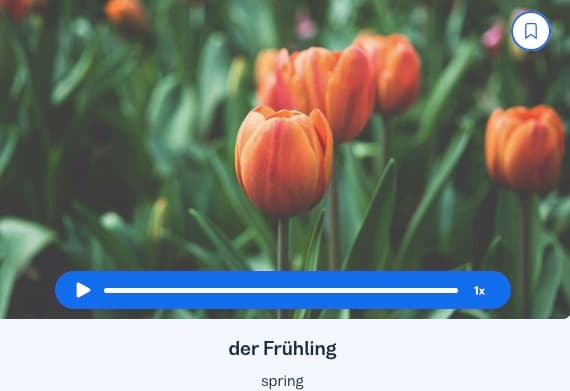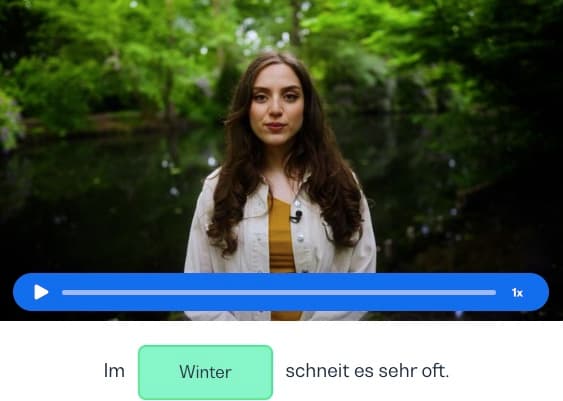I want to learn...
Hold on to your lederhosen (leather pants), because we're about to whisk you away on a ride through the seasons in German – bathing suit and winter coat required!
While in some countries there is only a warmer and a colder season or a rainy and a dry season, there are actually four seasons in German-speaking countries – from the first brave spring flowers making their way through the snow, to some very hot days at the lakes in the German summer, to the frosty winter wonderland in the Alps.
Let’s get started with what you need to know about seasons in German!
The four acts of German seasons
Unlike the English word “seasons,” the German equivalent Jahreszeiten has no further meaning and can only be used to refer to the four seasons of spring, summer, fall and winter. Let’s imagine the four seasons in German-speaking countries as an exciting play or film of changing scenes, each with its own characteristics and climaxes.
Before we break them down one by one, let’s have a look at some basic vocabulary:

Seasons in German
| German | English |
|---|---|
| Jahreszeiten | seasons |
| der Frühling | the spring |
| der Sommer | the summer |
| der Herbst | the fall |
| der Winter | the winter |
Act 1: Spring in German (Frühling)
March to May is the time when the German-speaking countries go from moody winter blues to a full-blown spring fling. As winter reluctantly lets go, these countries open their arms to the magical hug of spring.
Imagine a makeover for the landscape, turning it into a lively canvas of cherry blossoms and other flowers, throwing a wild party to celebrate nature's big comeback after some dark winter days.
March kicks off the spring gossip with a noticeable change in the vibe. As temperatures start their slow dance upwards, you can practically feel the positivity in the air. Naked tree branches decide it's time to sprout, and the once dull winter scene bursts into splashy color.
German spring is like a Disney movie, complete with colorful flowers, birdsong and new awakenings. Time to have your first beer in the Biergarten– check out our article on how to order your beer and more for some helpful vocabulary.
Here are some words and phrases you can use to talk about the spring in German:
German words for spring
| German | English |
|---|---|
| Blumen | flowers |
| Es wird wärmer | It’s getting warmer. |
| Die Temperatur ist angenehm | The temperature is pleasant. |
| Vogelgesang | birdsong |
| aufwachen | to wake up |
| ein neuer Start | a new start |
| Gartenarbeit | gardening |
| Ostern | Easter |
| Ostereier | Easter eggs |
Act 2: Summer in German (Sommer)
Summer in German-speaking countries is like a burst of sunshine-infused joy! Picture warm days that entice everyone outdoors for some serious fun.
It's a time when these countries seem to be putting on their party hats, inviting you to explore the great outdoors – think picnics in green parks, hiking in the Alps with incredible scenery, and refreshing dips in clear lakes.
And yes, in some places (but not everywhere) you can take part in the famous FKK (Freikörperkultur– nudism) when tanning or swimming in a lake.
But what are the real summer stars? The festivals! There are a lot of big outdoor parties in German-speaking countries during summer that are not even expensive. And we are not talking about Oktoberfest here, but about parties that serve up all kinds of music.
Summer comes with a bounty of fresh delights – strawberries, raspberries and blueberries everywhere! And when the heat gets too much, there's nothing like treating yourself to one of the variety of ice cream shops that you can find on any corner. Now, German weather in summer might not bring the scorching heat of the Sahara, but when the temperature nudges 95°F (35°C), which happens on a few days, you’ll better enjoy your time in an ice cream shop.
And here’s a fun fact – air conditioning is almost a myth here. You’ll find it in some bigger shared spaces like gyms or supermarkets but not in apartments or offices.
On the other hand, with the summer solstice in German-speaking countries in late June, you'll have very long days and can meet your friends for a drink in the park until 10pm.
Whether you're hiking through postcard-perfect countryside in the Alps, partying at a festival or soaking up rays at a lake, summer is basically an open invitation to kick back, make friends and enjoy all the goodness that Mother Nature has to offer. Prost!
German words for summer
| German | English |
|---|---|
| die Sonne | the sun |
| sonnig | sunny |
| Es ist warm. | It’s warm. |
| Es ist heiß. | It’s hot. |
| die Hitze | the heat |
| trocken | dry |
| der Eisladen | the ice cream store |
| ein Eis essen | to eat an ice cream |
| ein Picknick im Park machen | to have a picnic in the park |
| im See schwimmen | to swim in the lake |
| sich bräunen | to get a tan |
| der Strand | the beach |
| Ich habe Durst. | I’m thirsty. |
| Ich schwitze. | I’m sweating. |
Act 3: Fall in German (Herbst)
If you think spring is colorful, wait till you see the fall! As summer bows out, fall struts in with a cape of colors. It’s like nature throwing the most fabulous fashion show, with leaves turning into all kinds of yellows, oranges, browns and reds.
And guess what? People totally nail the fall fashion game as well, strolling around in functional Übergangsjacken and overcoats.
Even if the weather becomes more windy, cloudy and rainy, the fall season isn't just about that – it's a full-on celebration.
While migratory birds are taking a smart vacation to southern Europe and north Africa, the people know where the party’s at. We’re talking about the legendary Oktoberfest in Munich and Bavaria. It feels like the Coachella of fall, treating everyone to a month-long festival of music, delicious food and cultural extravaganzas that'll have you dancing in your lederhosen.
And as if that's not enough, there's German Unity Day on October 3, celebrating the harmony of East and West Germany.
But here's the big finale – the long Carnival season in Germany kicks off on November 11 at 11:11am. Don’t miss out on this season with its colorful costumes, spirited celebrations and Cologne turning into a vibrant Carnival land.
Apart from the many festivals, picture a delightful harvest featuring veggies like kale and squash, which officially marks the start of the soup season.
So whether you're having a tasty pumpkin soup, admiring the leafy confetti or joining the Carnival parade, fall in Germany is basically an invitation to party with nature and soak up the good vibes of the changing season. Get ready to embrace the joy with a sprinkle of festive flair – German fall style!
German words for fall
| German | English |
|---|---|
| der Wind | the wind |
| windig | windy |
| die Wolke | the cloud |
| wolkig | cloudy |
| der Regen | the rain |
| Es regnet. | It's raining. |
| frisch | fresh |
| kühl | cool / chilly |
| Es wird kälter. | It’s getting colder. |
| Blätter | leaves |
| bunt | colorful |
| die Ernte | the harvest |
| der Kürbis | the pumpkin / squash |
| die Suppe | the soup |
| die Übergangsjacke | transition jacket (literally translated as a jacket you wear between the hot and cold seasons) |
| das Oktoberfest | Oktoberfest |
| der Karneval / der Fasching | the Carnival |
Act 4: Winter in German(Winter)
And now for the grand finale –Winter! As winter's chill blankets the German-speaking countries, a festive mood unfolds, transforming the scenery into a magical wonderland.
For skiing enthusiasts, December to March is prime time for a sporty vacation in the Alps. So if you're hitting the slopes, get ready for amazing snowy mountain-top views!
The holiday season kicks off in December with some nice German winter holiday traditions such as Adventskalender, Nikolaus on December 6 with its treats and little presents in boots, and the three days of Christmas from December 24 to 26.
During this time, Christmas markets sparkle with lights and mulled wine all over the country. Culinary delights and New Year's Eve celebrations add flavor to dark winter days. All these things bring warmth to the cold months, which are sure to include several days with below-zero temperatures. Bundle up, sip cocoa and dive into the enchantment!
German words for winter
| German | English |
|---|---|
| der Schnee | the snow |
| Es schneit. | It’s snowing. |
| die Kälte | the cold |
| Es ist kalt. | It’s cold. |
| das Eis | the ice |
| eiskalt | freezing cold |
| die Winterjacke | the winter jacket |
| der Schal | the scarf |
| Handschuhe | gloves |
| Nikolaus | St. Nicholas Day (December 6) |
| der Adventskalender | the Advent calendar |
| Weihnachten | Christmas |
| der Weihnachtsmann | Santa Claus |
| der Weihnachtsmarkt | the Christmas market |
| Silvester | New Year’s Eve |
| Neujahr | New Year’s Day |
Conversation hacks for seasons in German
So far, we’ve covered important and frequent vocabulary for each season in German. Now it’s time for some phrases that you can use in German conversations. Keep the following phrases and sayings in mind to keep up with the natives.
Spring phrases
Die Blumen blühen. (The flowers are blooming.)
Die Vögel singen. (The birds are singing.)
Die Tage werden länger. (The days are getting longer.)
Summer phrases
Wir gehen zum See. (We're going to the lake.)
Die Sonne scheint. (The sun is shining.)
Lass uns ein Eis essen gehen! (Let's go for an ice cream!)
Fall Phrases
Die Blätter fallen. (The leaves are falling.)
Ich mache eine Kürbissuppe. (I‘m making pumpkin soup.)
Ich kaufe mir eine Übergangsjacke. (I’m buying a “transition jacket.”)
Winter Phrases
Lass uns auf den Weihnachtsmarkt gehen! (Let’s go to the Christmas Market!)
Die Tage werden kürzer. (The days are getting shorter.)
Es ist eiskalt. Du brauchst Schal und Handschuhe. (It's freezing cold. You need a scarf and gloves.)
General seasonal phrases and sayings:
Meine Lieblingsjahreszeit ist Sommer. (My favorite season is summer.)
Es gibt nur schlechte Kleidung, aber kein schlechtes Wetter. (There is only bad clothing, but no bad weather.)
Wir sind nicht aus Zucker gemacht. (We are not made of sugar. – This phrase means you can still go outside even though it’s raining.)
Das ist ein richtiges Aprilwetter. (This is real April weather. – This is a common phrase you can say in any month when it is windy, fresh and rainy, for example in July when it is supposed to be sunny and warm.)
Seasons wrap-up
Whether you're strolling into spring, soaking up summer vibes, diving into fall colors, or catching the winter magic, each of the German seasons promises its unique charm. In this magical play of Jahreszeiten, the German-speaking countries invite you to experience the different shades of nature’s beauty, the festivities, and the language that accompanies each turn of the seasonal page.
Now it’s time to try out some of the many seasonal words and phrases we’ve covered. Grab your linguistic tickets, find someone to practice with and join the fun!
AUTHOR

Mathias Neubauer
Newlanguages


